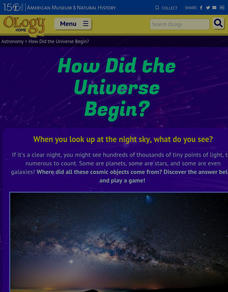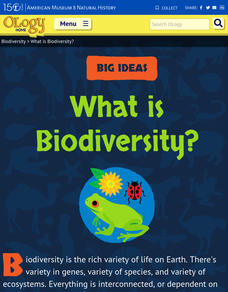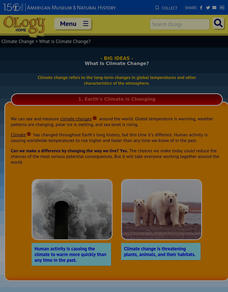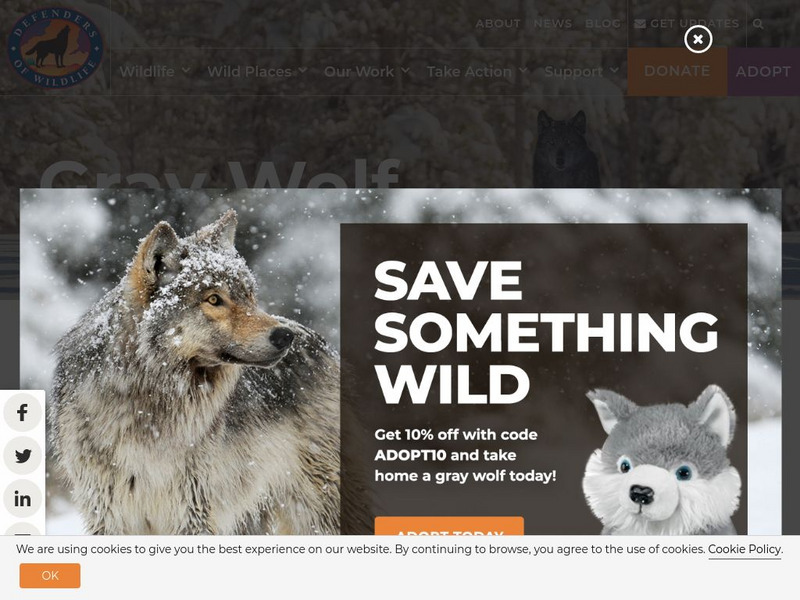American Museum of Natural History
Planetary Mysteries
Get to know our little part of the vast universe. Learners read about the common and not-so-common facts about each of the planets in the solar system. The interactive lesson includes a large amount of information as well as a quiz to...
American Museum of Natural History
The Amazing Mundo
Rocks and minerals are great on their own, but they also turn into some pretty amazing stuff! An online lesson explains the different types of materials we get from rocks and minerals, including glass, plastic, and coins. An embedded...
American Museum of Natural History
What's the Big Deal About Water?
It may seem simple, but water is one of the most unique substances on Earth. An interactive online lesson describes its properties and importance in so many different situations. Learners interact with the lesson to learn the role water...
American Museum of Natural History
What's the Big Deal About Paleontology?
Paleontologists could be considered detectives of the past. A quick online lesson describes the science of paleontology and the importance of fossils. Young scientists read about how paleontologists analyze the features of fossils to...
American Museum of Natural History
Going, Going...Gone?
Young environmentalists consider how scientists are attempting to save endangered species. They read about what causes extinction and steps to take to minimize the threats.
American Museum of Natural History
What is Marine Biology?
A marine environment covers the majority of the earth but is arguably the least understood. Teach young scientists about the characteristics of oceans and ocean species using an interactive online lesson. The in-person or remote learning...
American Museum of Natural History
How Did the Universe Begin?
The Big Bang Theory is more than a television show. Pupils read how Edwin Hubble observed other galaxies and noticed that the galaxies are moving away from each other. Scholars learn about the idea of the big bang and what happened next...
American Museum of Natural History
What is Biodiversity?
Not all dogs are the same just like not all finches are the same. An interactive online lesson helps individuals learn about the causes and limitations to biodiversity. The clickable sections describe the basics of the genetics of...
American Museum of Natural History
What Is Climate Change?
So many factors show that climate change has arrived. Learners read through an online resource that explains the data and the consequences of climate change. They also review strategies for slowing or even reversing the global influence.
American Museum of Natural History
Journey to the Stars
Fifteen detailed pictures and informative captions delve deep into the exploration of stars—their life cycle and importance in the universe.
Smithsonian Institution
National Museum of Natural History: Ocean Planet
Detailed website that was a companion to a 1995 traveling exhibit of the Smithsonian. Links to lesson plans and other educational materials are at the bottom of the page. Enter the exhibition to explore the world of the ocean.
Defenders of Wildlife
Kids' Planet: Wolf Discovery Curriculum
Here is a wonderful resource for both students and teachers alike! Content includes a wealth of articles on wolves, ranging from vital statistics to hunting techniques, as well as lesson plans and quizzes for kids of all ages!
NASA
Nasa: Finding the Distances Between Planets
NASA site features a lesson plan that teachers can use to help their students see how far they are from each of the planets.
Teacher Planet
Teacher Planet: Mozart
Several lessons, units, and featured website links for learning about Mozart geared to elementary grades (includes worksheet PDF printouts).
American Geosciences Institute
American Geosciences Institute: Astronomy
Eight hands-on lessons module in which students explore the characteristics of planet Earth, its moons, the sun, the solar system, planets, and the difference between science fact and science fiction.
Other
Celestia
This site provides a free space simulation that lets you explore the universe in three dimensions. There is a forum for teachers and lesson plans that help enhance student use of the simulation. A program must be downloaded in order to...
NASA
Nasa: The Space Place
This site is geared towards elementary learners, but most lessons can be modified for older learners. Space-related classroom activities, printable images of Earth and space, thought-provoking Space Place Musing podcasts and math-related...
Space Telescope Science Institute
Amazing Science: Solar System Trading Cards
Amazing Science looks at the Solar System with this FAQ site and lesson plan.
NASA
Nasa: Planetary Geology
This unit teaches students about the forces that shape planets and help them to evolve. Lessons provide background information and assessments.
abcteach
Abcteach: Earth Day Activities
[Free Registration/Login Required] How can you treat the earth with more respect? Check out this resource featuring links to elementary activities to celebrate Earth Day. You will find word searches, crossword puzzles, reading...
















